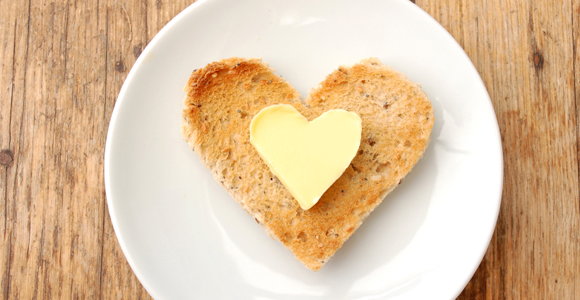Butter, made from the fat content in milk, is comprised of about 80% milk fat and 20% water and proteins. Looking at the numbers across the board, a tablespoon of butter contains about 100 calories and 11 grams of fat (7 grams of that being saturated). The steep calorie count and lack of many other nutritional components has left many health conscious individuals to turn towards other healthier substitutes.
Olive Oil
Replacing butter with olive oil has been linked to numerous heart-healthy benefits. While caloric-wise, the two do not differ significantly, the difference lies in the types of fat that the two possess. Butter contains 66 percent saturated fat, while olive oil contains half that at 33 percent. Olive oil is also rich in Vitamins A, D and E and quickly satisfies hunger, possibly leading to fewer calories ingested at mealtime.
Other Oils
There are a variety of different oils out there, each one suited to fill a different hole in your cooking and flavor needs. Oils such as coconut or peanut oil are full of healthy fats and each brings a unique taste to whatever meal you are preparing. Nut oils such as walnut or macadamia are also loaded with monounsaturated, heart-healthy fats as well as fat-soluble vitamins. Flax-seed oil contains a high amount of omega-3 fatty acids, noted for their numerous heart-healthy benefits. As mentioned earlier, oils are usually similar to butter in their caloric density, however the added benefits and variety of flavors make them a great substitute to keep stocked in your kitchen.
Fruit Puree
If you're looking to replace your morning butter-and-toast, fruit puree is a much healthier alternative. You can find many different varieties including apple, grape, mango, strawberry and many more. These fruit purees have less fat than butter and offer a flavorful substitution. As a plus, the fruits offer food forms of natural antioxidants and added fiber, which helps with digestion and fullness.
Avocado
While avocados may be higher in fat, this fruit is full of heart-healthy monounsaturated fat. These kinds of fats can help lower "bad" LDL cholesterol and maintain "good" HDL cholesterol. This green fruit also offers more protein, fiber, and B vitamins than butter. It is also rich in folate, potassium, vitamin E, and vitamin K -- nutrients that butter just does not provide. Full of omega-3s, avocados taste great when thinly sliced on a salad or paired with a handful of salty seeds or nuts. When baking, substitute half the amount of butter in your recipe for mashed avocado for a creamy, healthy twist on your favorite baked treats.
Hummus
Hummus is a Mediterranean spread that is delicious with bread, vegetables and as a butter substitute. Hummus is made from chickpeas, which are a filling combination of lean protein, complex carbohydrates and healthy fats. They are also high in fiber, which makes them slower to digest, leaving you feeling full and satisfied.
Applesauce and Greek Yogurt
If you're looking to make a healthy twist on your favorite baked goods, omitting some or all of the butter from your favorite recipes can greatly reduce the amount of calories and fat. While applesauce is commonly used to replace oil in recipes, it can also be used as a butter alternative in cake-like recipes. Just replace half of the amount of butter with applesauce, or go for the full amount if you don't mind a denser, moister cake or bread. If it's healthier cookies you're after, replace half the amount of butter in your recipe with half the amount of full-fat plain Greek yogurt (for example, if the recipe calls for one cup of butter, use a half cup of butter and one quarter cup of yogurt). Play around with these substitutions and transform your buttery baked goods into healthier treats with significantly less fat and added fiber, vitamins and minerals.
While all of these butter substitutions are healthy choices in their own right, they key to healthy eating is always moderation. Daily consumption of butter may not be the healthiest choice, but overindulging on too much of these alternatives will be no better. In order to reap all of the benefits from these alternatives, keep moderation in mind, and enjoy!

Sarah Dreifke is a freelance writer based in DeKalb, IL with a passion for nutrition education and the prevention of chronic disease. She holds a Bachelor of Science in both Dietetics and Life Sciences Communication from the University of Wisconsin-Madison. Currently, she is working towards a combined Master's Degree in Nutrition and Dietetics as well as a dietetic internship at Northern Illinois University.



